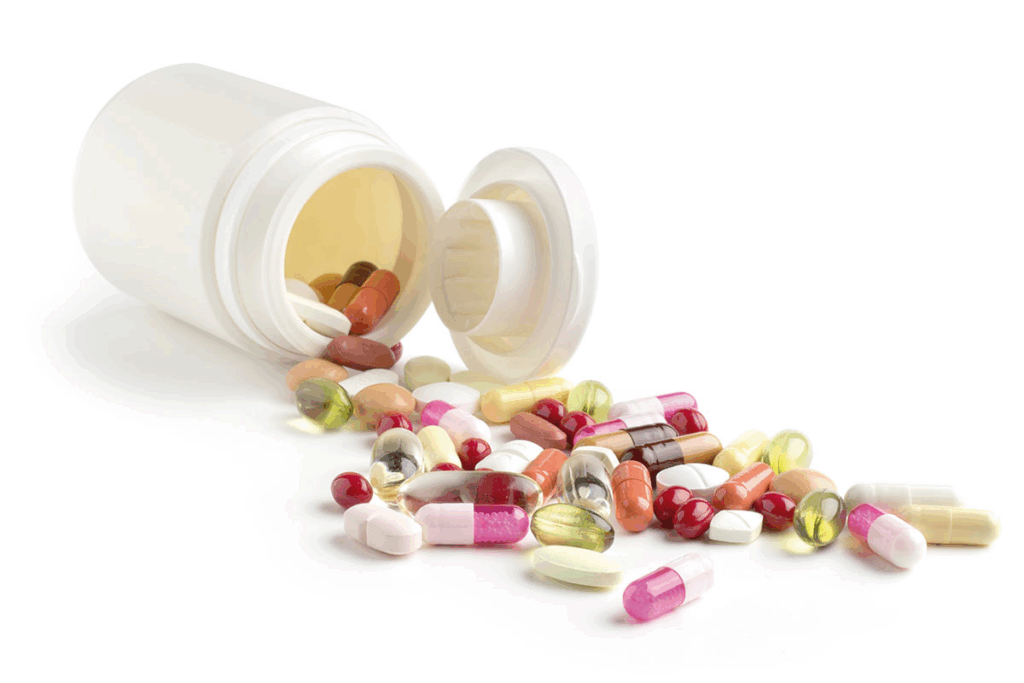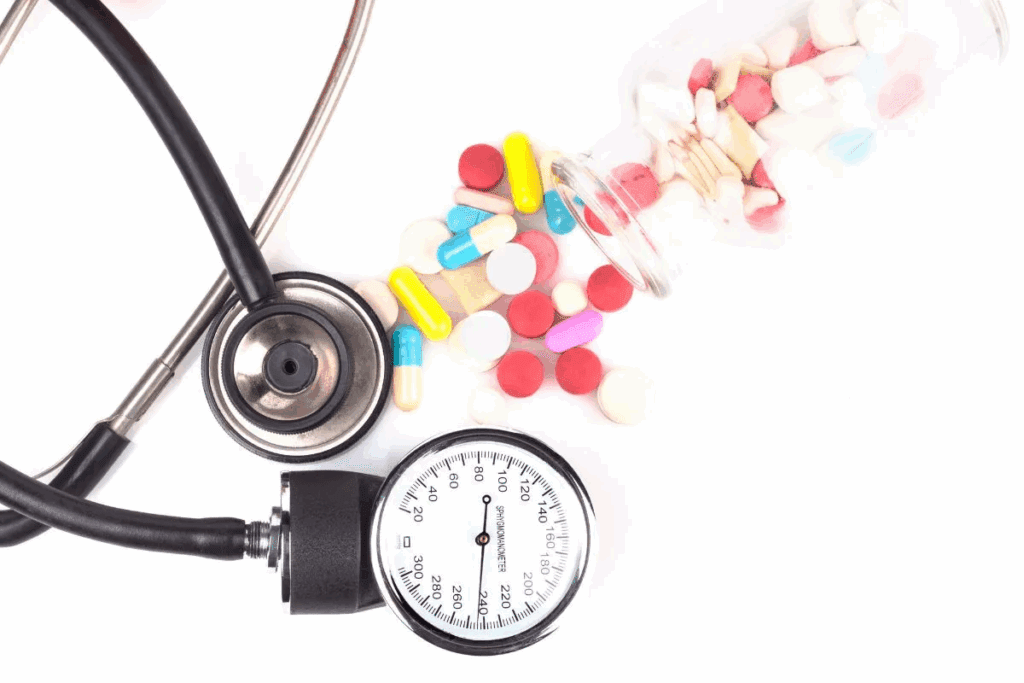Last Updated on November 25, 2025 by Ugurkan Demir

Erectile dysfunction affects many men worldwide, impacting their quality of life and relationships. At Liv Hospital, we know that erectile dysfunction can be caused by many factors, including certain medications. Does blood pressure medicine cause impotence? See a list of 12 medications that are known to cause or contribute to erectile dysfunction and impotence.
About 25% of erectile dysfunction cases are linked to prescription and over-the-counter medications. Many men don’t realize that their daily medications could be affecting their sexual performance. We understand the importance of knowing the link between medications and erectile dysfunction to provide effective care.
At Liv Hospital, we are dedicated to helping men understand how their medications might affect their sexual health. By identifying the medications that contribute to erectile dysfunction, we can find ways to manage and treat this condition effectively.

Medications and erectile dysfunction have a complex relationship. Erectile dysfunction (ED) affects millions of men globally. It has many causes, but medication-induced ED is a big concern.
About 25% to 30% of patients say their ED is caused by meds. The FDA’s National Pharmacovigilance Database shows 5-alpha reductase inhibitors and neuropsychiatric meds cause nearly 46% and 40% of ED reports, respectively.
| Medication Category | Percentage of ED Reports |
| 5-alpha reductase inhibitors | 46% |
| Neuropsychiatric medications | 40% |
Medications can mess with sexual function in different ways. They can change hormone levels, affect blood flow, and mess with the nervous system. For example, some meds lower testosterone, leading to less sex drive and ED.
It’s key for doctors to understand how meds cause ED. By knowing the side effects of different meds, doctors can choose better treatments. This can help lower the risk of ED.

The link between blood pressure meds and erectile dysfunction is complex. High blood pressure is a big health issue that needs careful treatment. This often includes taking antihypertensive drugs.
But, some of these drugs can affect sexual function. This raises concerns about their impact on quality of life.
Hypertension can lead to erectile dysfunction (ED). It damages blood vessels, which affects blood flow to the penis. This makes it hard to get or keep an erection.
Also, hypertension often comes with other health problems like diabetes and heart disease. These can also cause ED.
There are different types of blood pressure meds, each with its own risk for ED. Thiazide diuretics and beta-blockers are common and linked to ED.
Knowing the side effects of these meds helps both patients and doctors. It helps manage blood pressure without harming sexual health.
Thiazide diuretics are often used to control high blood pressure. But, they can also affect sexual health. These drugs help by making more urine, which lowers blood pressure. Yet, they might harm erectile function.
Hydrochlorothiazide (HCTZ) is a common thiazide diuretic. It helps with high blood pressure but can cause erectile dysfunction. The exact reason is not clear, but it might be due to less blood volume and changes in blood flow.
Research shows that erectile dysfunction is a concern for HCTZ users. Doctors need to consider both the drug’s benefits and its sexual side effects.
Chlorthalidone is another diuretic for high blood pressure. Like HCTZ, it might cause erectile dysfunction. The reasons are similar, which means other diuretics could have the same effect.
It’s important for patients and doctors to talk about the risks and benefits of these drugs. They might need to find other treatments or change the medication to avoid erectile dysfunction.
Beta-blockers are used to control high blood pressure. But, they can also affect sexual health. We’ll look at how different beta-blockers impact sex and what help is available for erectile dysfunction.
Propranolol and metoprolol can increase the risk of erectile dysfunction. They can change blood flow and hormone levels, making it hard to get an erection.
Research shows these drugs can lower sexual function. It’s key to talk to your doctor about your meds to understand the risks and benefits.
Carvedilol and newer beta-blockers might be better for sex. Carvedilol, for example, might cause fewer sex problems. This could be because it also blocks alpha receptors, helping blood flow.
If you’re on beta-blockers and have sex problems, talk to your doctor. They might change your meds or dose to help with sex without harming your heart.
Many people taking antidepressants face sexual problems. These issues often come from SSRIs and SNRIs. These medicines help with depression and anxiety but can harm sex life.
These drugs can lower libido and make it hard to get excited or reach orgasm. Knowing which antidepressants cause these problems is key for both patients and doctors.
SSRIs are very common antidepressants. Fluoxetine (Prozac) and sertraline (Zoloft) are two that often lead to sexual issues. Many people taking these drugs struggle with low sex drive and trouble reaching orgasm.
SNRIs can also mess with sex life. Venlafaxine (Effexor) and duloxetine (Cymbalta) are used for depression and anxiety.
If you’re having sex problems with antidepressants, talk to your doctor. They might change your medicine or dose to help.
5-alpha reductase inhibitors, like finasteride and dutasteride, can cause sexual problems in some users. They are mainly used to treat enlarged prostate and male pattern baldness.
Finasteride is a common drug for BPH and male baldness. But, it can lead to sexual issues, like low sex drive and trouble getting an erection. These problems can last even after stopping the drug.
Common sexual side effects of finasteride include:
Dutasteride is used for BPH by blocking testosterone to DHT conversion. This can cause sexual side effects, similar to finasteride.
It’s key for patients to talk to their doctor about the risks and benefits. This helps them make the best choice for their treatment.
Erectile dysfunction can happen with many medications, not just the ones we think about. This includes some blood pressure drugs and antidepressants. But other drugs we use a lot can also cause this problem.
Antihistamines help with allergies but can also cause erectile dysfunction. Diphenhydramine, found in sleep aids and allergy meds, can make your mouth dry and sleepy. It can also affect sex. Cetirizine, another antihistamine, might cause ED too, but it’s usually less likely to do so.
Opioids can mess with your hormones, leading to less testosterone. This can cause erectile dysfunction and lower sex drive. The risk is higher if you take opioids for a long time.
H2 blockers help with stomach acid but might cause erectile dysfunction. Cimetidine (Tagamet) can lead to ED because it affects hormones. Ranitidine is less likely to cause this, but some people might experience sexual problems with it.
Antipsychotics treat mental health issues but can also cause erectile dysfunction. Risperidone can lead to sexual side effects, including ED. Haloperidol can also cause sexual problems because it blocks dopamine receptors, affecting sex.
If you have erectile dysfunction, talk to your doctor about your meds. They might find other options that don’t affect sex as much.
Figuring out if your meds are causing erectile dysfunction can be tough. You need to know the side effects of your meds and how they might affect your sex life.
When symptoms show up is key to figuring out if meds are causing ED. Usually, ED from meds starts a few weeks to months after starting. Keep a log of when you started your meds and when ED symptoms began.
ED can come from many things, like health issues, lifestyle, or meds. To know if meds are the cause, look at other possible reasons. Talk to your doctor about these:
Some blood pressure meds, like ACE inhibitors and ARBs, might help with ED. They make blood vessels relax and improve blood flow. This can help with ED symptoms. ACE inhibitors include lisinopril and enalapril. ARBs include losartan and valsartan.
Understanding how your meds might affect ED and talking to your doctor can help. You can figure out the best way to handle your ED together.
Managing erectile dysfunction caused by medication needs a full approach. This includes knowing the reasons behind it and looking for other ways to treat it. We talked about how some blood pressure drugs, antidepressants, and 5-alpha reductase inhibitors can lead to ED.
Changing to different medications or adjusting treatment plans can help with ED symptoms. For example, switching from thiazide diuretics or beta-blockers to ACE inhibitors or ARBs might help manage ED.
It’s key to work closely with healthcare providers to find the best way to handle medication-induced ED. This way, people can lessen the effect of ED on their life and overall health.
Managing medication-induced ED well requires teamwork between patients and healthcare providers. By understanding the causes and looking into other treatment options, people can take back control of their sexual health.
Thiazide diuretics, beta-blockers, and antidepressants are common culprits. So are 5-alpha reductase inhibitors, antihistamines, opioid pain meds, H2 blockers, and antipsychotics.
Yes, some blood pressure meds like thiazide diuretics and beta-blockers can lead to erectile dysfunction. But, not all do. Some, like ACE inhibitors and ARBs, might even help.
Antidepressants, like SSRIs and SNRIs, can mess with neurotransmitters in the brain. This can lead to sexual problems, including erectile dysfunction.
These drugs, used for prostate issues, can cause side effects like erectile dysfunction and low libido. This is because they affect hormone levels.
Yes, some antihistamines, like diphenhydramine and cetirizine, can lead to erectile dysfunction. This is likely due to their sedative and anticholinergic effects.
Look at when your symptoms started. Talk to your doctor about it. They can help find if your meds are the cause and suggest alternatives.
Yes, some blood pressure meds like ACE inhibitors and ARBs can help. They improve blood flow and reduce resistance in blood vessels.
If your meds are causing ED, talk to your doctor. They can help adjust your meds or find other treatments.
Stopping a med that causes ED might help. But, always talk to your doctor first. They’ll make sure you’re not ignoring a bigger health issue.
National Center for Biotechnology Information. (2025). 12 Medications That Cause Erectile Dysfunction and Impotence. Retrieved from https://pmc.ncbi.nlm.nih.gov/articles/PMC9537247/
Subscribe to our e-newsletter to stay informed about the latest innovations in the world of health and exclusive offers!